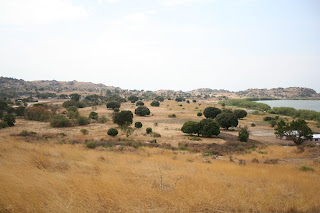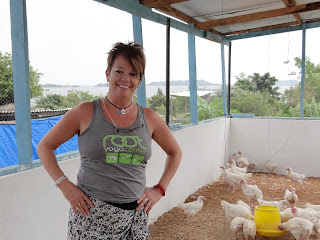Since its official opening in the fall of 2014, JBFC's healthcare clinic and on-site nurse have made massive strides in improving the healthcare of our JBFC community.
Three-hundred and thirty students means an awful lot of paper cuts and scraped knees. More than 70 employees, many of them doing physical labor, that's a lot of kitchen burns and "oops" cuts. Forty-eight residential girls adds in a slew of coughs, colds, and bee stings. Add to this environmental challenges and diseases specific to Tanzania, such as Typhoid fever, malaria, and amoebic infections, and the JBFC community faces many and varied healthcare challenges. Tanzania as a whole faces a shortage of healthcare workers, so without our little clinic, a medical professional could be a dozen miles away.

With the help of our supporters in America, JBFC is making a dent in some of these challenges. We're providing health care to our immediate community. Not only treating what we can, but making sure to refer girls, students, and staff members for more healthcare when needed.
In 2016, however, we are doing even more to tackle our healthcare challenges, using a multi-pronged approach of outreach and capacity building.
First, since her arrival in October 2014, JBFC's nurse, Paskazia, has spent dozens of hours (many times with the help of volunteers!) educating our students, our girls, and our staff about everything from proper first aid to personal hygiene to the importance of environmental cleanliness. In classrooms, in one-on-one sessions, and in the various kitchens and dining halls around campus, Paskazia has made the education and disease prevention, her most important tool in improving the health of our community.
This year, we are taking healthcare outreach to a whole new level on our campus and in our surrounding community.

So far this year, Nurse Paskazia has conducted a food-preparation and disease prevention seminar with our kitchen staff regarding the prevention of food-borne illnesses.
She has planned monthly age-appropriate seminars focusing on nutrition, family planning, first aid, HIV/AIDS awareness, mental health, personal and environmental hygiene, and disease detection and prevention.
By the end of this year, all of our students from pre-school through Form 4 (U.S. equivalent of 11th grade) will have received basic introductions to all of these topics.
Knowledge is power, especially when fighting disease.

While 2014 and 2015 saw JBFC improving health-related education on our campus, we hope to take the fight into our surrounding community.
We have begun planning several seminars that will be offered to our community, potentially through community partners like the Kitongo Primary School, aimed at providing free information and tools to our neighbors.
The more people we talk to the bigger our impact, and the better our chance of reducing and preventing disease.
JBFC's friends in Tanzania are taking notice. A local community partner saw what we were doing to improve health on our campus and is now providing all of JBFC's residential girls with free annual check-ups.
JBFC is also improving our capacity to reduce diseases on campus and improve the general health of our 400+ family. While treating cuts, burns, scrapes, and common illnesses like the cold and flu are important, 2016 will see us take prevention and treatment up a notch.
In January, we were able to receive new mosquito nets for all of our JBFC girls from a community partner. Simply sleeping with a net at night can largely prevent malaria, the number one killer of children under five-years-old in Tanzania.
In March, thanks to a generous donation from a JBFC volunteer, we will begin construction of new hand-washing stations at our school dining hall to allow for better sanitation and hygiene. Improved hygiene, especially in the dining hall, will help reduce food-borne illnesses like Typhoid and intestinal parasites. By the end of April, working with another community partner, we hope to be able to start testing and treating our staff, students, and family for malaria.
While JBFC has made important strides over the past year in improving the health of our community, we still have a long way to go. Our staff, students,and girls still suffer from malaria and typhoid. But thanks to you these preventable and treatable diseases have not been fatal. That's the difference having regular access to a licensed medical professional can make.
Preventative care is still a relatively unknown in this part of the country. With the continued support of our friends around the world, the hard work of our nurse, and the dedication of our volunteers, we believe 2016 will be the healthiest year to date for our JBFC family.
Seth Diemond is JBFC's Chief Operating Officer in Tanzania.

 11-year-old Mwashi will be entering the third grade. Her older brother Peter already attends JBFC's Joseph & Mary Schools. JBFC worked with the family to make sure their daughters, as well as
11-year-old Mwashi will be entering the third grade. Her older brother Peter already attends JBFC's Joseph & Mary Schools. JBFC worked with the family to make sure their daughters, as well as




















































